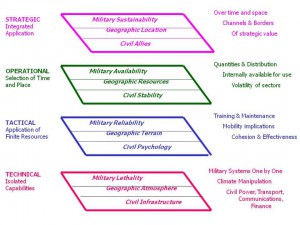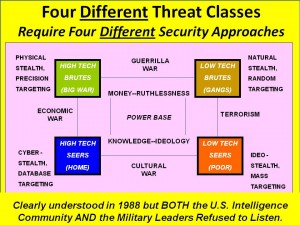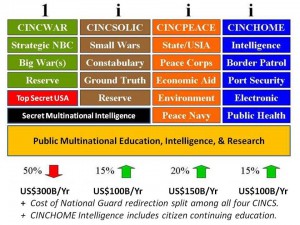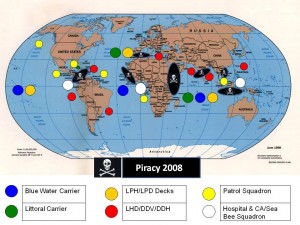School Solution: To fabricate the worst possible threat, each service taking its own liberties, so as to justify the buying of the most outrageously complex and generally unreliable weapons and mobility systems with extremely heavy logistics tails, none of which can be supported by national or tactical intelligence “systems” also built by variations of the lowest bidder on government-specifications cost-plus terms. The Office of the Secretary of Defense (Acquisition, Intelligence, Policy) is responsible for producing as much paper as possible, ideally with no fewer than three acronyms per line, so as to keep tens of thousands of lower-grade civilians employees busy, thus justifying the maximum possible number of senior executive positions irrespective of any actual responsibility. As a precaution against the military actually doing anything sensible, any contractor employing or otherwise subsidizing a minimum of five retired general officers will be permitted veto power over any honest analysis that slips through.
A Pro Chuck Hagel Answer Below the Line

Click Here to See Personal Page
Citation: Robert David STEELE Vivas, “The Purpose of Military Intelligence,” Phi Beta Iota the Public Intelligence Blog, 19 December 2012.
ROBERT STEELE: Israel, the neo-conservatives, and the military-industrial complex are going all out to defeat the planned nomination of Senator Chuck Hegel to be Secretary of Defense. I personally believe that there will be enough push-back to see him through confirmation, and that is a good thing. I have done the homework and I am certain that we can create a 450-ship Navy, a long-haul Air Force, and an air-liftable Army that over the course of ten years would allow us to close most of our military bases overseas, and bring our troops — and their personal purchasing power — home. I not only know we can do this with half the dollars DoD gets now, but I also know that retiring half the flag officers and half the senior executive service, is a necessary pre-requisite to rebooting intelligence with integrity within DoD.
The purpose of intelligence is to provide decision-support at all levels of analysis (strategic, operational, tactical, and technical) across all mission areas (Whole of Government), with deliberative attention to culture, history, language, and all possible future scenarios. At its core, the intelligence (decision-support) function is what enables a community of interest to balance ends, ways, and means.

The purpose of military intelligence when assuming that civilian intelligence exists or is competent, is to do for the military what intelligence is supposed to be doing for all of the Cabinet departments: provide decision-support at the strategic, operational, tactical, and technical levels in order to assure that we have advance warning of threats, that we train, equip, and organize to defeat a full range of threats, and that we are victorious, at the lowest possible cost in blood, treasure, and spirit, when we are forced to employ our military.
In the absence of competent civilian intelligence, military intelligence must play a “hub” role and help the other Cabinet departments to create their own intelligence capabilities, while creating a national-level capability for all elements of the government to access relevant open sources of information in all languages and mediums — the Open Source Agency (OSA) will do that, with an embedded National Monitoring and Planning Center as suggested by General Tony Zinni, USMC (Ret), and a Multinational Decision Support Centre as I have proposed to CENTCOM, DIA, the Department of State, and the Office of Management and Budget (OMB).

At the strategic level, the purpose of military intelligence is a combination of strategic warning, strategic policy support, strategic (long-term) force structure support, and strategic engagement both with the rest of the US Government, and with such allies and coalition partners of convenience as are aligned with our needs and interests. The strategic level pertains to the affordable, sustainable long-term integrated development and application of all sources of national power.
At the operational level, the purpose of military intelligence is to provide the theater commander and their subordinate unit commanders with all necessary decision support relevant to operational warning, operational policy support, operational (mid-sterm) force placement support, and operational engagement with both the rest of the US Government and with such allies and coalition partners of convenience as are aligned with our needs and interests. The operations level pertains to the application of national power in time and space so as to deter or defeat the enemy without fighting if possible, and if not, to defeat the enemy decisively across all mission areas, stabilizing and reconstruction the operational area as needed.

At the tactical level, the purpose of military intelligence is to provide the supported commander in a specific mission area with the best possible decision support so as to optimize the application of finite resources restricted to a specific time and place by higher authority.
At the technical level, the purpose of military intelligence is to provide very detailed technical, tactical, operational, and strategic decision-support necessary to create affordable, sustainable, inter-operable weapons, mobility, communications, and other systems, so as to create joint and coalition capabilities suitable to the full spectrum of military operations inclusive of stabilization & reconstruction operations previously known as Operations Other Than War (OOTW).

The purpose of military intelligence leadership is to ensure that military intelligence is providing decision-support at all four levels persistently, pervasively, and with full access to all relevant sources (i.e. all open sources in all languages and mediums); and to ensure that the military leadership is not left deaf, dumb, and blind by the failure of national intelligence and their own noncholance. At its core, the purpose of military intelligence is to provide continuing education for military leaders to enable them to cope with challenges that the war colleges and their prior experience have not addressed.
See Also:
2009 Robert Steele: Politics & Intelligence–Partners Only When Integrity is Central to Both
2009 Intelligence for the President–AND Everyone Else
2009 Perhaps We Should Have Shouted: A Twenty-Year Restrospective
2008 Rebalancing the Instruments of National Power (Full Text Online for Google Translate)
2008: Creating a Smart Nation (Full Text Online for Google Translate)
2001 Threats, Strategy, and Force Structure: An Alternative Paradigm for National Security
1993 From Schoolhouse to White House
1993 On Defense & Intelligence–The Grand Vision
1989 Al Gray (US) on Global Intelligence Challenges



